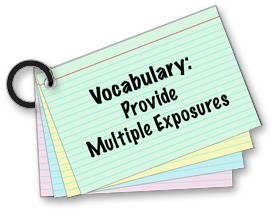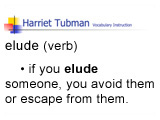What should content-area teachers know about vocabulary instruction?
Page 6: Providing Multiple Exposures to Vocabulary

Another element of effective vocabulary instruction is for teachers to ensure that their students have repeated exposures to key vocabulary. Vocabulary and conceptual knowledge are built gradually over time, and multiple exposures offer opportunities to revisit words and information and to relate words and ideas to one another. If students are to build a deep understanding of key vocabulary and its appropriate use, a single exposure will prove insufficient. Rather, students need to practice with words across lessons and in different contexts. Multiple exposures to vocabulary can be achieved through various ways, such as:
- Independent reading
- Partner activities
- Teacher-led discussions
Watch the video below to see educational consultant Anita Archer demonstrate teacher-led vocabulary instruction in a middle school language-arts class (time: 4:23).
Video is courtesy Anita L. Archer.
Transcript: Demonstrating Teacher-Led Vocabulary Instruction
Teacher: Some of them, we’re going to go over the meanings because they are in our part. And the first word here is what, everyone?
Class and teacher: Elude.
Teacher: Don’t write anything down. Pencils down, and read the definition and…go
Class and teacher: If you elude someone, you avoid them or escape from them.
Teacher: So if you elude someone, you avoid them or escape from them. Read the first example sentence and…go
Class and teacher: The runaway slaves eluded the patrollers who were hunting them.
Teacher: Okay, and so they might hide somewhere, go into a barn, go into the woods, go into the back of a cart, but they want to avoid those patrollers that are hunting them down. They eluded them. Read the next example.
Class and teacher: The convict…
Teacher: Uh-oh, teacher mistake. Raise your hand if you’ve ever heard a teacher make a mistake. Isn’t it pathetic? So let’s go back and try it again. Go.
Class and teacher: The convict eluded the police for ten years.
Teacher: So the convict hid out, stayed away from the police, never was identified by the police. Eluded the what, everyone?
Class and teacher: Police.
Teacher: Last example. Go.
Class and teacher: When playing hide and seek, Jose eluded all of the other players.
Teacher: So was Jose found? Yes or no?
Class: No.
Teacher: Because to elude is to avoid or escape them. Get ready to tell me if you would elude. So you are coming to this school, and you don’t want anybody to notice you, and so you sort of walk down the halls and when people come you go down another hall. Did he elude people? Yes or no, everyone?
Class: Yes.
Teacher: Yes, okay. So he’s walking down the hall, and he waves to people. Hi, how you doing, Jose? Hi, Maria. Did he elude people? Yes or no?
Class: No.
Teacher: No. So the principal has called you to the office. I don’t want to go see the principal. I think I’ll go to the boys’ room. Did he elude the principal? Yes or no?
Class: Yes.
Teacher: And then the principal comes into the bathroom and says… Did he elude the principal at that moment, yes or no?
Class: No
Teacher: No. Okay and so elude. So this you can see how it might have a part of this story. And, two’s, I want you to tell your partner your best guess about how the word elude might be used in the story about Harriett Tubman, a slave in a slave state. So tell your partner how the word elude might be used in the story we’re going to read.
Student: Elude might be used in the story when Harriett Tubman eludes the guards and the slavery.
Teacher: Yes, so the people that want to take her back into slavery, she might try to elude them.
Student: How they had…how she helped people escape.
Teacher: Oh, so it could be used that way. Excellent! Okay, fall silent. So here’s what I heard. First, when she’s trying to escape, and the patrollers are after her with their hound dogs, she might try to what, everyone?
Class and teacher: Elude them.
Teacher: And then you’re talking about later in her life when she became a part of the Underground Railroad. She might help other people what?
Class and teacher: Elude.
Teacher: The people that were looking for them. So I say to myself, in my vocabulary book, I’m going to record this word, which is a what, everyone? A…
Class and teacher: A verb.
Teacher: And I don’t have to copy this. I want to put it in my own words and make it shorter. So I might write down something like elude, and then I’m going to indent under it and maybe say, you know, avoid others. Okay, that is one of the meanings of elude. So in your book you’re going to write down the vocabulary term and then in your own words the definition. When you’ve done that, put your pencil down. I’ll be looking at your vocabulary logs. Go.
(Close this panel)
Activity
For each video below, identify what stage the teacher is implementing.
Activity A
Teacher: And the first word is what, everyone?
Class: Elude.
Teacher: Elude. Don’t write anything down. Pencils down, and read the definition, and…go.
Class and teacher: If you elude someone, you avoid them or escape from them.
Activity B
Teacher: Read the first example sentence, and…go.
Class and teacher: The runaway slaves eluded the patrollers who were hunting them.
Teacher: Okay, and so they might hide somewhere, go into a barn, go into the woods, go into the back of a cart, but they want to avoid those patrollers that are hunting them down. They eluded them.
Activity C
Teacher: So tell your partner how the word elude might be used in the story we’re going to read.
Student: Elude might be used in the story when Harriett Tubman elude the guards and the slavery.
Teacher: Yes, so the people that want to take her back into slavery, she might try to elude them.
Videos are courtesy Anita L. Archer.


